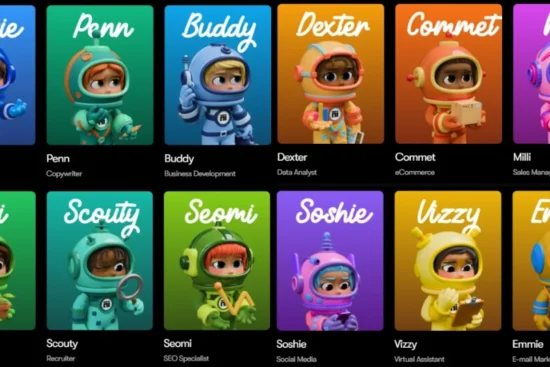
The Metaverse, a collective virtual shared space, is rapidly evolving from a futuristic concept into an integral part of our digital lives. As we approach 2025, experts predict that virtual reality (VR) and augmented reality (AR) will be major drivers of this transformation, fundamentally changing how we work, socialize, and play. From virtual offices and meetings to immersive gaming and entertainment experiences, the Metaverse promises to blur the lines between the physical and digital worlds. In this blog, we explore how the Metaverse will reshape both work and play by 2025.
What Is the Metaverse?
Before delving into the specifics of how the Metaverse will impact work and play, it’s important to understand what it is. At its core, the Metaverse is a digital universe composed of interconnected virtual spaces where users can interact with each other and digital environments. It combines technologies like VR, AR, and blockchain to create a shared, persistent, and immersive online experience. Users can enter the Metaverse through VR headsets, AR glasses, or even traditional computing devices, depending on the platform.
By 2025, the Metaverse is expected to be much more than a place for entertainment. It will be a multifaceted environment that encompasses work, socializing, gaming, shopping, education, and much more.
The Metaverse and the Future of Work
One of the most significant ways the Metaverse will transform society is in how we work. The traditional office, which has dominated the work landscape for centuries, is being replaced with virtual offices and collaborative digital environments. Let’s take a closer look at how the Metaverse will change the future of work.
Virtual Workspaces and Remote Collaboration
With the rise of remote work and hybrid work models, the Metaverse offers a new solution for remote teams. Instead of relying on video conferencing tools like Zoom or Microsoft Teams, employees will enter fully immersive virtual offices where they can interact with colleagues, share documents, and collaborate in real-time. VR headsets will allow workers to sit around a virtual table, engage in face-to-face meetings, and even brainstorm on virtual whiteboards. The digital workspace will be more interactive, dynamic, and productive than today’s flat screens.
Platforms like Meta’s Horizon Workrooms and Microsoft’s Mesh are already exploring these possibilities, and by 2025, we can expect more advanced and refined solutions. Virtual workspaces will be designed to promote creativity and productivity, offering customizable environments suited to the needs of different industries and roles.
Digital Twin Offices
One interesting concept emerging in the Metaverse is the idea of “digital twin” offices. This concept involves creating virtual replicas of physical office spaces in the Metaverse. Employees working from home can enter these virtual environments and interact with colleagues in an office that feels real, even if they are miles away. These digital twin offices will allow workers to engage in social interactions, attend meetings, and experience the office culture without leaving their homes.
Digital twins could also be used for training purposes, simulating real-world scenarios that employees might encounter in their roles. For example, employees in the healthcare industry could use VR to practice medical procedures, or those in engineering could explore 3D models of products before they are physically built.
Enhanced Job Training and Simulation
The Metaverse will also revolutionize job training. Traditional training methods often rely on costly simulations or in-person demonstrations, but virtual environments provide a cost-effective and scalable way to replicate real-world scenarios. Whether it’s a retail employee learning how to interact with customers or a pilot training on complex flight maneuvers, VR can provide realistic, immersive training experiences that help employees gain valuable skills.
For example, industries like construction, manufacturing, and healthcare could benefit from simulation-based training in the Metaverse, which could be more accessible and less risky than real-world simulations. By 2025, the Metaverse will likely play a key role in making job training more interactive, effective, and accessible for a wide range of industries.
Virtual Networking and Events
The Metaverse will also change the way professionals network and attend conferences. Instead of traveling to a physical location, employees can attend virtual conferences, seminars, and trade shows. In the Metaverse, these events will be more immersive and engaging, with opportunities for attendees to interact with speakers, visit virtual booths, and network with other professionals in ways that go beyond what is possible on a traditional digital platform.
By 2025, we can expect virtual events to be more common, especially as the technology improves. Attendees will be able to explore large virtual spaces, participate in interactive workshops, and engage in real-time discussions, making these events more inclusive and accessible.
The Metaverse and the Future of Play
While the Metaverse is expected to revolutionize work, it will also bring transformative changes to how we play, entertain ourselves, and connect with others. Gaming, entertainment, and socializing are key areas where the Metaverse will thrive. Let’s explore how the Metaverse will reshape the future of play.
Immersive Gaming Experiences
Gaming has long been a driving force behind the development of virtual reality technology, and the Metaverse will only amplify this trend. By 2025, VR and AR will provide highly immersive gaming experiences that take players beyond the traditional screen and into fully realized virtual worlds.
In the Metaverse, players will not just control avatars on a screen, but will actively participate in digital worlds. Whether exploring vast open-world environments, engaging in fast-paced multiplayer battles, or solving complex puzzles, the gaming experience will feel more lifelike and engaging. The Metaverse will enable gamers to socialize, form teams, and create communities, all while interacting in 3D spaces.
Additionally, blockchain and NFTs (non-fungible tokens) will provide gamers with the ability to buy, sell, and trade digital assets, creating new opportunities for players to monetize their in-game achievements and virtual property.
Socializing and Virtual Communities
Beyond gaming, the Metaverse will revolutionize how people interact socially. Platforms like VRChat and Meta’s Horizon Worlds are already allowing users to meet and socialize in virtual environments, and by 2025, these experiences will be more realistic and accessible. Instead of communicating through text or video, people will be able to meet as 3D avatars, participating in social activities, attending virtual concerts, or even exploring virtual cities together.
Virtual social spaces will allow individuals to connect with others across the globe, breaking down barriers of geography and time. Whether it’s meeting friends for a virtual coffee, attending a virtual concert, or collaborating on creative projects, the Metaverse will provide an entirely new way to experience social interaction.
Virtual Shopping and Consumer Experiences
The Metaverse will also bring a new level of interactivity to e-commerce. By 2025, virtual shopping malls and digital marketplaces will become commonplace. Users will be able to enter virtual stores, try on clothes via their avatars, and even test out products in virtual environments before making a purchase. The integration of VR and AR with e-commerce will allow consumers to make more informed decisions, all from the comfort of their own homes.
In addition, virtual goods and NFTs will become more widely used, creating a thriving digital economy where users can buy, sell, and trade items within virtual worlds. These digital assets, whether they’re collectibles, fashion items, or even virtual real estate, will become valuable commodities in their own right.
Virtual Tourism and Exploration
By 2025, the Metaverse will allow people to explore virtual replicas of real-world locations or entirely new digital landscapes. Whether it’s visiting historical landmarks, touring foreign countries, or embarking on fantastical adventures, virtual tourism will provide a safe and accessible alternative to physical travel. VR headsets will allow users to experience immersive, lifelike environments, offering a new way to experience the world without leaving home.
Conclusion
The Metaverse in 2025 will undoubtedly transform both the worlds of work and play. Virtual reality will redefine how we collaborate in the workplace, providing immersive, interactive environments that bridge the gap between remote and in-office work. Meanwhile, the Metaverse will revolutionize the way we game, socialize, shop, and experience entertainment, offering new possibilities for connection and exploration. As the Metaverse continues to evolve, its potential to change our lives in both professional and recreational spheres is limitless. By 2025, we will likely see an even greater integration of virtual and physical worlds, fundamentally changing how we work, play, and connect with one another.












